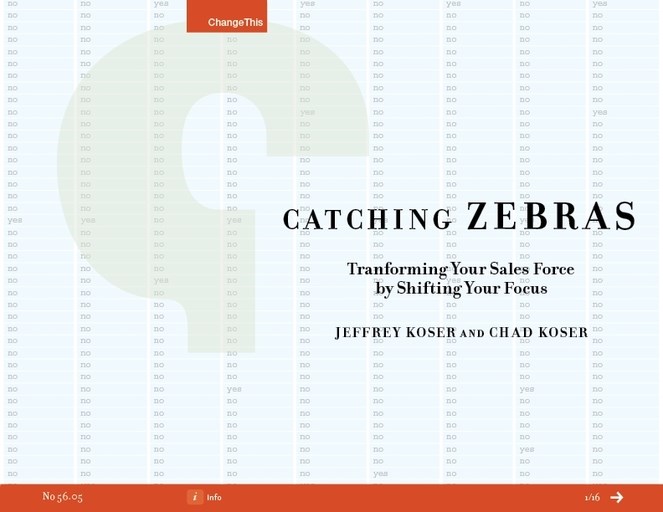ChangeThis RSS
"I am convinced that a good many of the 'survival strategies' that organizations are adopting are just wrong. Tragically wrong. For more than three years, my colleagues and I have been studying a set of managers who successfully grew their businesses in the face of uncertainty and scarcity. And they taught us an alternative path—a road less traveled—that suggests that growth needn't come with a high price tag and lots of risk. Their approach is custom made for today's climate of risk-aversion and limited capital. It may sound counterintuitive at first—and you've got to be willing to entertain a different view of reality to understand it. But once you've wrapped your head around this different worldview—this 'alternative reality'—you'll wonder why you didn't see it sooner.
[...]
Your biggest challenge is not to find a way to trim another 10% off your work force; it is to make dealing with instability your sweet spot; to hone your ability to leverage surprise and uncertainty rather than just react. In doing so, you just might find a new set of possibilities that wouldn't exist in a stable, predictable world. Opportunities that you'd never find sitting on that couch."
Continue reading
"Taking charge has never been easy.
New leaders are expected to diagnose correctly, land on a brilliant strategy, pull together a powerful team, and inspire everyone to execute. Unfortunately, long lead times are gone. The months that leaders used to get for pondering, debating, or hiring outside consultants has shrunk to days.
New leaders are expected stop the bleeding, decide who's in and who's out, make the strategic choices, and start racking up their wins right away. Shareholders, employees, customers, and communities believe that if you're tapped to lead you'd better be able to hit the ground running from day one.
I started looking for a database of dos and don'ts for new leaders learned the hard way through years of trial and error and discovered there's virtually no reliable data available. Ninety-three percent of executives admit that their organization has never kept any records of the steps that led to their best or worst management decisions.
So I started from scratch."
Continue reading
"The Zebra concept itself is simple. Create the profile of your perfect prospect and measure all other prospects against perfection. Zebra score every prospect, decide your tipping point and don't go over it. This is the hard part. Saying no for sales people is very hard. Yes is in their vernacular. No isn't even in their DNA. So when we tell you that part of the success of this process is to say 'no,' you'll understand this process will take some inspection to ensure it succeeds. Someone once said you can't expect what you don't inspect. Inspection is necessary for the Zebra way to succeed. You can drag a Zebra to water... you get the idea."
Continue reading
"This manifesto is dedicated to what ought be a mind-scorchingly obvious idea.
An idea that every successful company ought to know and understand in their bones.
An idea that the vast majority of companies nonetheless fail to get.
That idea?
That empathy equals growth."
Continue reading
"I believe in progress.
I believe that our contribution to the progress of civilization is a good measure of how well we have used our lives.
Humankind has had writing for about 13,000 years. Books got pretty cheap around 600 years ago when Gutenberg created movable type. The Internet has made access to good ideas almost free for billions of people. So why aren't the vast majority of us happy and healthy by now? Where is progress?"
Continue reading










